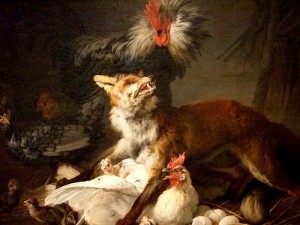Don't avert your eyes
Yesterday, one of my creative writing students popped by and told me she had finished writing an essay, but she wasn’t going to put it up on her brand new blog because it was too dark. She is a food writer, and writes essays so succulent, so delicious the words melt on your tongue. This particular essay, however, apparently involve her guinea fowl, a fox, and a loaf of bread. She felt quite comfortable writing about baking the loaf of bread, which seemed a pleasant sort of activity, one which would make her foodie readers happy they’d popped by. But she didn’t want to reveal the decapitated guinea fowl, the bloody piles of feathers and bone to which the fox was reducing her flock, one by one.

"Fox in a Chicken Yard" by Jean-Baptiste Huet (1766) --- The artist does not avert his eye
She had tears in her eyes as she talked about her poor doomed hens. We talked about what it means to eat, and how closely we are tied to to death, all of us, even the vegans. (Even vegans, for all their good intentions, kill millions of little microbes just by washing their hair, for example.) I urged her to post the entire blog, and see what reactions she got. I’m not sure if she will, but if she does, I’ll post a link.
Her experience reminded me of when I lived in an old farmhouse in Normandy, France. How many mornings I woke to find the fox had got into my neighbor’s hen-house again, and apparently chosen to eat his dinner on my doorstep. It’s not all Martha Stewart and Disney out in the country. It can be very red of tooth and claw.
That’s life, too. And life, in all its hues, is what concerns us as writers. Therefore, if we want to write well, we must look without flinching. Robert Olen Butler says, “The artist must go into the white hot center of himself, and our impulse when we get there is to look away and avert our eyes.” Japanese film director Akira Kurosawa said, “To be an artist means never to avert your eyes.”
Not even from decapitated hens.
I’m not saying one should, artificially, go looking for the ugly, the gross, the squalid or the disturbing. What I’m saying is that if it presents itself, if it is part of our experience, it is our duty as writers to bear witness to it.
On the other hand… I once knew a poet who sent me, unsolicited, a 120 page “lyric” sexual memoir. I found it very hard reading indeed (you’ll pardon the pun), and it took me a while to figure out I was uncomfortable not with the graphic content, but by how calculated it felt. When the poet asked me for my reaction I told her I was, frankly, shocked (and anyone who knows me knows I don’t shock easily). She replied, “Aha! Excellent! I mean to shock!”
Well, I happen to think that’s a bit cheap. I don’t want to be the literary equivalent of a kid picking his nose and displaying the slimy green results on the end of his finger in order to elicit shrieks of horror from his sister.
Nevertheless, sometimes it’s crucial, even if unsettling, to look at the way the world really is, at the way humans, and animals, behave when not in Disney cartoons. Sometimes it’s crucial (perhaps always) to examine ourselves through that same clear lens Memoirs, for example, often fail when the author spares herself, when she avoids admitting her own flaws and failures. In doing so, she walls herself off in a garden of perfection, and the reader (all too aware of his own flaws), fails to identify.
I suggest to emerging writers that if they find themselves writing about something that makes them uncomfortable, makes them squirm a little, they should pay attention. That’s often where a truth lies, where power rests. We have to give ourselves permission, as writers, to reveal the entire truth as we experience it, not merely that which is pleasing, or supports the status quo. We need to welcome the Trickster Raven sometimes, the Holy Ghost, the whirlwind that comes in and upsets the scene, showing it in a new light, speaking the previously unspeakable, thinking the previously unthinkable.
The authentic resides in seeing things clearly, when they are beautiful and gentle, certainly, but even when they aren’t pretty, even when they aren’t flattering, even when they’re covered in blood and bits of bone.
The real problem with clean-up versions is that they are *boring*. Sometimes you have to leave behind a little trail of sleaze just to make your reader follow you into the forest.
I couldn’t agree more, Darryl. We leave out the messy bits afraid we’ll alienate readers, when in fact readers can spot the inauthentic from a hundred yards and that’s — as you say — what bores them and we all know a bored reader is one unlikely to continue. If the trail is sleazy, show me the sleazy. If you do it well enough, I’ll happily follow you.